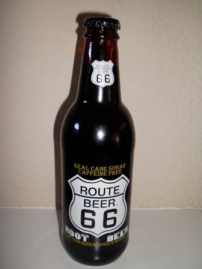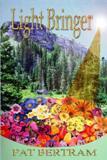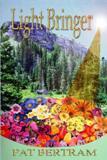Pat Bertram's Blog, page 262
August 12, 2012
Beauty Pageants, Route 66, Old Cars . . . and Me
 I went to a Route 66 festival this weekend, and though it had its disappointments — relatively few people showed up and I sold only a few books — it also had a few highpoints — I met some old friends, I made some new ones, and . . . I sold a few books!
I went to a Route 66 festival this weekend, and though it had its disappointments — relatively few people showed up and I sold only a few books — it also had a few highpoints — I met some old friends, I made some new ones, and . . . I sold a few books!
The beauty pageant that took place in the center of the artists’ and authors’ pavilion was too surreal to be a lowpoint and too bizarre to be a highpoint. The first pageant event seemed more of a bitty pageant then a beauty pageant since it featured babies barely able to walk (one needed her mother to hold her upright). I couldn’t help wonder how that crown would affect the rest of the winner’s life. Will it be the highpoint of her life even though she’ll never remember winning it? Or will it be the first of many wins, giving her an inflated sense of her worth?
It seemed to me that the older girls and women who entered did have an inflated sense of worth. (The preschoolers and girls in the early grades just seemed sad with their make-up, mincing walks, practiced smiles, and regal waves. And the 11-year-old winner looked terrified as if the responsibility of being a queen weighed heavy on her skinny little shoulders.) During the speech portion of the event, one of the older girls (a young women, actually), vowed that if she were to win, she’d uphold the integrity of Route 66. Typical budding politician, she never explained how she would achieve this grandiose and absurd goal. For cripes sake, most of the road no longer exists. (The longest parts of the road still extant are in San Bernardino County, probably because that section of Route 66 meanders through undeveloped desert.)
I guess I don’t get the mystique of any of it — beauty pageants, route 66, old cars (some of which are remade beyond any semblance of authenticity) — but I seem to be in a minority. The economic impact of Route 66 is huge — according to a recent study by The National Parks Service, Route 66 generates over $132 million per year in the communities through which it passes. The economic impact of beauty pageants is astronomical — over $5 billion!!!
By selling a few books at the festival, I added to that gross revenue, even if my income from those books was in the low two digits. Don’t know whether to be proud of that or not.
Tagged: babies in beauty pageants, Beauty Pageants, festival, old cars, Route 66, San Bernardino County

August 11, 2012
More California Dreaming on Route 66
One of the oddest places I visited on Route 66 was the bottle farm outside of Victorville. All the sculptures were created from bottles and other artifacts found in the Mojave Desert.
I wish you could have visited this fascinating place with me, but maybe we’ll meet on Route 66 some other time when we are dreaming of the Mother Road and days gone by.
Tagged: bottle farm, bottle sculptures, California, Route 66, sculptures

August 10, 2012
California Dreaming on Route 66
I am in Victorville. California at the San Bernardino County Fairgrounds, signing books at the Route 66 International Festival. Route 66 enthusiasts from all over the world are here to celebrate the Mother Road and a world gone by.

Ruins along Route 66 in California near Bagdad
The road that fueled dreams of a better life is mostly absorbed into the modern world of interstate travel, but there are still some remembrances of those nostalgic times.

Bagdad Cafe from the movie of the same name
The original Bagdad Cafe is long gone. This structure was the Sidewinder Cafe, renamed for use in the movie, and is located 50 miles west of where Bagdad once stood. Odd to see the screen come to life in this dusty, out of the way place.

Roy’s Motel and Cafe in Amboy on Route 66
Roy’s Hotel and Cafe in Amboy, California, is being restored to it’s former glory (if such an elemental structure can be considered glorious.) The route beer I got at the small store at the gas station was glorious, or perhaps I was simply thirsty. I’m sure you’ve seen similar photos before, but I took this one. Well, I took all of them.

Route Beer. What writer could resist such a pun?
Tagged: Amboy, Bagdad Cafe, Route 66, Route 66 International Festival, route beer, Roy's Motel and Cafe, Victorville CA

August 9, 2012
Getting My Kicks on Route 66
 Each year, the California Historic Route 66 Association selects one of the eight states through which Route 66 runs to host the Route 66 International Festival. This year, the festival will be held from August 9-12, 2012 at the San Bernardino County Fairgrounds in Victorville, CA. Making it an even more historic event, the fairgrounds are on old Route 66! With the theme “California Dreamin’ on Route 66”, the Route 66 International Festival 2012 will attract thousands of Route 66 enthusiasts, historians, fans and custodians of the “Mother Road” from across the country; including international visitors from 17 different countries, as well as local residents. And me.
Each year, the California Historic Route 66 Association selects one of the eight states through which Route 66 runs to host the Route 66 International Festival. This year, the festival will be held from August 9-12, 2012 at the San Bernardino County Fairgrounds in Victorville, CA. Making it an even more historic event, the fairgrounds are on old Route 66! With the theme “California Dreamin’ on Route 66”, the Route 66 International Festival 2012 will attract thousands of Route 66 enthusiasts, historians, fans and custodians of the “Mother Road” from across the country; including international visitors from 17 different countries, as well as local residents. And me.
I’ve been accepted as a participant in the festival, and I’ll be there signing my books on August 10th and 11th. Except for Daughter Am I, the story of a road trip from Colorado to Chicago, my books don’t have anything to do with Route 66, but I’ve had little luck with writer’s conferences and library presentations, so I’m going to try something completely different. It should be interesting. I’ll have to stay for the two days rather than do what I normally do at festivals — walk around for a few minutes then leave. (I never did know how to have fun. At least not what other people consider fun.)
So, if you’re going to be in Victorville on August 10 and 11th, be sure to stop by the fairgrounds and look me up. I’m at the Alaska Pavilion, table 10. I’ll be waiting for you.
Tagged: California Historic Route 66 Association, Route 66, Route 66 International Festival, San Bernardino County Fairgrounds, Victorville CA

August 8, 2012
Weird Trick to Get You to Read This Blog
Did the weird trick work? Did you come here because of “weird trick”? I see those very words a hundred times a day in ads in the sidebars of various sites, and I was curious if it would work to get people to click on this blog link.
“Weird trick to help you lose weight.”
“Weird trick to slash your electricity bill.”
“Weird trick to help men feel 18 again.”
“Weird trick to help save your life.”
“Weird trick to make you look twenty-years younger.”
 What is it that people respond to? The “weird” or the “trick” or does it have to be a combination of both? I did fall for the weird trick once, even sat through an entire video on why a certain weight-loss program worked, but when they didn’t tell me what the weird trick was unless I plunked down a bunch of cash, I never again felt the urge to find out any more weird tricks. Have you? Did you learn any weird tricks?
What is it that people respond to? The “weird” or the “trick” or does it have to be a combination of both? I did fall for the weird trick once, even sat through an entire video on why a certain weight-loss program worked, but when they didn’t tell me what the weird trick was unless I plunked down a bunch of cash, I never again felt the urge to find out any more weird tricks. Have you? Did you learn any weird tricks?
The other common advertising hook is “they hate him/her.”
“Plastic Surgeons hate this mother for developing anti-aging cream.” (It’s always a mother developing the skin cream, as if that automatically makes it safe and gentle, though I’ve known some heinous mothers in my time.)
“Electric companies hate this man for developing a way to save on your utitilty bills.”
This one never hooked me. I mean really, do doctors and utility companies even pay attention to the mother or the developer who found a way to save a few pennies? Do they care? I doubt it. Did this come-on ever hook you? If so, did you learn anything?
Tagged: ads, clicks, sidebar ads, trick, weird, weird trick

August 7, 2012
How does your environment/upbringing color your writing?
 Because I’ve always lived in the shadow of mountains, mountains always shadow my writing. This is especially true in Light Bringer. The story begins when a baby is found on the doorstep of a remote cabin in the shadows of the Rocky Mountains, and continues years later when the foundling, now an adult, returns to the high country to find out who she is. The mountains in my novel are both protective and secretive — the hills protect those who live in their shadow, yet the mountains also harbor terrible and awesome secrets that threaten those same people.
Because I’ve always lived in the shadow of mountains, mountains always shadow my writing. This is especially true in Light Bringer. The story begins when a baby is found on the doorstep of a remote cabin in the shadows of the Rocky Mountains, and continues years later when the foundling, now an adult, returns to the high country to find out who she is. The mountains in my novel are both protective and secretive — the hills protect those who live in their shadow, yet the mountains also harbor terrible and awesome secrets that threaten those same people.
Whenever I needed a hiding place for the secrets of the ages in Light Bringer, I searched maps for isolated mountain ranges, and ended up with a library beneath the Ahaggar Mountains in Algeria, ancient artifacts beneath the Beishanmai Mountains in the Gobi Desert, and experimental spacecraft beneath the McDonnell Ranges in Australia. I’d heard about the mountains in Australia where the experiments were being done, and in my research I’d come across hints of what lay beneath the Ahaggar Mountains, but the Gobi location was strictly a guess, though later I discovered that in fact, caves deep inside the Beishanmai Mountains were repositories for ancient treasures.
Maybe the mountains themselves were helping with the book.
Here are some responses from other authors about how their environment colors their writing. The comments are taken from interviews posted at Pat Bertram Introduces . . .
From an interview with: J. P. Lane, Author of “The Tangled Web”
I’ve traveled from an early age and I’ve lived in several countries, so maybe that’s the reason The Tangled Web trots around the world a bit. I chose Prague as one of the locations, because I’d been to Prague the year before I started writing it and the memories were still fresh. The familiarity with the Hispanic characters comes from having lived in Miami for twenty years and having had a lot of Hispanic friends and work associates. I also lived in Puerto Rico at one point. And there’s the Jamaican dialect in the book. Only someone who’s lived in Jamaica for some length of time could write that.
From an interview with: Dale Cozort, Author of “Exchange”
I grew up in a fair-sized city, but I spent a lot of time with relatives in the country, so I probably write rural life a little more authentically than someone without that experience. I also have a computer background, so there is always a little bit of the techie in my stories. I have to dial that back so it doesn’t get in the way of the story.
From an interview with: Sherrie Hansen Decker, Author of “Love Notes”
Love Notes is my first Christian inspirational novel and certainly reflects some of my deepest beliefs about my Christian heritage. In other of my books, the main characters have been rebelling against the very faith Hope clings to in Love Notes. So yes, my Christian beliefs definitely color my writing, whether in shades of guilt or hope. In Love Notes, I love it that Hope’s strong faith is intact even though she’s lost everything dear to her, including her husband, who died in a tragic car accident. Tommy has everything a man could want, yet he is cynical and discontented and very short on faith. In the end, Tommy finds hope, joy, peace and love where he least expects it — as have I on several occasions!
What about you? How does your environment/upbringing color your writing?
(If you’d like me to interview you, please check out my author questionnaire http://patbertram.wordpress.com/author-questionnaire/ and follow the instruction.)
Tagged: Ahaggar Mountains, environment and writing, Gobi Desert, Light Bringer, mountain shadows, Prague

August 6, 2012
Rubicon Ranch: Necropieces — The Story Continues
 Rubicon Ranch is a collaborative and innovative crime series set in the desert community of Rubicon Ranch and is being written online by the authors of Second Wind Publishing. Seven authors, including me, are involved in the current story — Rubicon Ranch: Necropieces.
Rubicon Ranch is a collaborative and innovative crime series set in the desert community of Rubicon Ranch and is being written online by the authors of Second Wind Publishing. Seven authors, including me, are involved in the current story — Rubicon Ranch: Necropieces.
Residents of Rubicon Ranch are finding body parts scattered all over the desert. Who was the victim and why did someone want him so very dead? Everyone in this upscale housing development is hiding something. Everyone has an agenda. Everyone’s life will be different after they have encountered the Rubicon. Rubicon Ranch, that is.
Although some of the characters were introduced in Rubicon Ranch: Riley’s Story, a previous collaboration, Rubicon Ranch: Necropieces is a stand-alone novel.
We hope you will enjoy seeing the story develop as we write it. Let the mystery begin! Whodunit? No one knows, not even the writers, and we won’t know until the very end!
Chapter 9: Melanie Gray
by Pat Bertram
Melanie locked the front door of the house and turned around to face the day. It was clear and warm with a platinum sun shining in an azure sky. She felt her spirits rise. With such lovely weather, things couldn’t be as bad as they seemed. She marched down the driveway, and her spirits plummeted as fast as they had risen. The sheriff’s tan Navigator, like a brooding predator, loomed in the driveway of the Sinclair house next door.
Melanie had tried to forget Sheriff Seth Bryan and the conflicted feelings he had aroused in her, but apparently she hadn’t succeeded. She could feel the emotions rushing back to fill the emptiness inside her. She still couldn’t tell if she’d felt more drawn to him or more repelled by him. With any luck, she’d never have to explore those feelings. As soon as he finished his business and left the area, she could forget him again.
She heard the sound of his voice, though not his words, and for a moment she considered dashing back into the house to avoid any encounter with him, but then she realized the truth. The sheriff had no interest in her. It had been almost three months since she’d last seen him, and in all that time, he had made no effort to contact her.
She lifted her chin. She didn’t need him or any man. They were all worthless creatures who had no regard for anyone but themselves.
Still, it wouldn’t hurt to see what he was up to.
She took a few steps forward so she could see the front door of the Sinclair house. The sheriff looked the same as he always had. Jeans and a white shirt with a badge on the shoulder clothed his lean, flat-bellied body, and a navy blue ball cap with a yellow “Sheriff” embroidered on it covered most of his dark brown hair. And he still wore those ridiculous mirrored sunglasses.
The sheriff and Moody seemed to be standing closer together than politeness dictated. Could something be going on between the two of them? Movement in the passenger seat of the Navigator caught her attention. Deputy Midget. If the sheriff intended anything shady, surely he wouldn’t bring a deputy along to witness his behavior? Then this must be an official visit.
Moody looked okay — happy, even. It had been very quiet the last week or so without “The Sounds of Silence” blaring at all hours, and she’d probably been enjoying herself in Morris’s absence.
The sheriff starting walking toward his vehicle. Melanie squatted to retie a shoelace, hoping he wouldn’t catch sight of her. She might have the courage not to seek refuge in the house, but she had nothing to say to him.
When she heard the sheriff’s Navigator slowly moving down the street, she squelched a pang of disappointment. As annoying as his attentions were, at least they had reminded her she was alive. She’d been living with the dead — or rather memories of the dead—for way too long.
She arose with only the slight aid of one hand to push her erect, and angled her steps to the right of her driveway, intending to head up Delano Road to the desert. She paused, took two steps to the left.
The Daily Indecision is how she’d come to think of this inability to act. “Sounds like a newspaper,” she said aloud. “They’d print both sides of every story since the editor would be unable to decide which view to stand behind. Or maybe the paper would be blank because they’d never be able to decide which stories were newsworthy. And since when do you talk to yourself?”
Since Alexander died. She often wandered in the desert, trying to understand her husband’s death and her grief, and she’d gotten in the habit of talking aloud to him, hoping he could help make sense of her chaotic thoughts. He never responded. But then, he’d seldom replied even before he died.
When had their relationship become all about him? And why hadn’t she noticed the change? She sighed. Probably because she’d spent so much time online doing research for the coffee table books she and Alexander wrote. Well, she wrote. He took the photos. After his death, she discovered he’d somehow squandered the advance for the book about the Mojave Desert they’d contracted for, so now she needed to take the photographs in addition to writing the text. She thought she’d become good at shooting photos, but just this morning she’d received an email from her publisher:
“Some of your photos are usable, but most are uninspired. You take photographs, but the great photographers, like Alexander, make photographs. And when they make photographs, they make love. We feel the empathy between the external and internal events.”
Whatever that meant.
“What it means,” she said aloud, “is that you have work to do.” She took five resolute steps up Delano Road, then stopped. She could see Eloy Franklin hunched on his porch like a land-locked amphibian, watching everything that went on in his vicinity.
After all the turmoil the neighborhood had gone through recently, after all the deaths, she thought that things would have changed, but there Eloy sat, as unapproachable and forbidding as always. She’d smiled at him a couple of times when she passed in front of his house, but he’d never acknowledged her efforts at friendliness by so much as a nod.
Unable to stand the thought of Eloy’s scrutiny, she turned left. The sheriff’s navigator hadn’t gotten far, only a few houses away. The vehicle still moved slowly, as if the sheriff were looking for something. Trying to see the neighborhood through his eyes, Melanie peered down Delano Road. A petit woman held a camera to her face, either taking photographs or hiding behind it. Did Sheriff Bryan think the woman was Melanie? Melanie smiled to herself. Whatever faults the man might have, mistaking one woman for another was not one of them. Melanie had seen the woman several times before; she was shorter, prettier, and younger than Melanie, and had the clear luminous complexion of someone with a mixed race heritage.
Beyond the woman, a skinny man lurched along the side of the road. Melanie had also seen him several times before, and he worried her. Anger seemed to crackle around him, like lightning right before it strikes.
The Navigator’s siren blared, and the vehicle shot down the street and tore around the corner onto Tehachapi Road, heading east.
A dark cloud seemed to lift from the neighborhood, and Melanie’s indecision disappeared. She turned right, past Moody’s house, past the strange no-man’s land that separated the Sinclair land from the Franklin land, past Eloy’s house.
The wilderness beckoned.
* * *
Melanie stood at the crest of knoll and surveyed the expanse of desert. Somewhere out there, midst the creosote bushes and cacti, a photograph she could make waited for her — an image so compelling, viewers would immediately sense her empathy with the subject.
But how did one get emotionally connected to something as vast and as alien as the Mojave Desert? Then she remembered Alexander saying he looked for a significant detail. By focusing on a single feature, by making it the heart of the photo, the rest of the scene came into focus.
Crap. I’ll never get the hang of photography. Damn you, Alexander, for putting me through this.
She heard a sound closing in on her from behind, a leisurely whup . . . whup . . . whup. She turned and froze, transfixed by the raven gliding by. It flew so close she could see the brown pupil of its bright black eye and the purple and blue sheen of its feathers. She’d never seen such a huge bird—the body looked bigger than a cat, and its wings spanned at least three feet, maybe four. For a moment, it seemed to hang motionless, then a graceful wing beat stirred the air and propelled it forward.
Melanie fumbled with her camera, almost in tears. She’d had a perfect opportunity to make a photograph, but she’d become so lost in the moment, she’d forgotten all about taking a picture. Alexander wouldn’t have forgotten. His camera had been an extension of his hands, his eyes. He never let anything get between him and an image he wanted to capture. Not even Melanie. Especially not Melanie.
Then she heard it behind her again, the whup . . . whup of wing beats. And this time she held her camera ready. As the second raven passed her, she caught the image. Joy burst inside her.
I did it!
Only then did it strike her as odd that the two ravens had been so focused on their goal that they hadn’t seemed to notice how close they’d been to her.
The first raven had already disappeared, but she watched the second one descend behind a rocky outcrop thirty feet away.
She followed a barely perceptible track through the scrub to where six or seven ravens pecked at what looked to be the carcass of a small animal. A rabbit, maybe. Thinking how wonderfully the image of this raw savagery would contrast with the majesty of the flying raven photo, she crept closer. And gagged.
The ravens weren’t feeding on a rabbit, but something oddly familiar and totally out of place.
* * *
Melanie waited for Sheriff Bryan and Deputy Midget to pick their way up the rock-strewn path to the top of the hill. The sun glinted off the sheriff’s mirrored sunglasses, making him appear soulless.
When he drew near, Sheriff Bryan grunted. “I wish you’d stop finding bodies in such out of the way locations.”
“I didn’t find a body. I found . . .” She swept out a hand, showing the track and which direction he should travel.
The sheriff furrowed his brow at her, then followed the track. Deputy Midget trailed after him. Melanie brought up the rear.
Sheriff Bryan stopped by the outcropping. “A boot? You called me here to see crows playing with an old bloody boot? You must really be desperate to talk to me.”
“Desperate?” Melanie stared at him, the heat of anger flushing through her body. “Are you really so self-absorbed that you think I called you here on a pretext? I didn’t call you. I called dispatch and told them exactly what I found. It’s not a pretext, and they’re not crows. They are ravens.”
The sheriff and his deputy exchanged shrugs, then proceeded forward. The ravens squawked, rose as one, and circled above them, as if protecting their treasure.
Sheriff Bryan squatted, then whipped his head around, lips drawn back in a rictus, and faced Melanie. “A foot? That’s what you found, a foot?”
Midget took a step back. “It looks like something out of Morris Sinclair’s books.”
“Necropieces,” Bryan said, turning back to the foot.
“So where’s the body?” Midget asked.
“Maybe there isn’t one. Someone could have been illegally dumping medical waste.” Bryan rose and loomed over Melanie. “What do you know about this?”
She studied him for a moment, wondering what was going on behind those sunglasses. “Are you accusing me of something?”
The sheriff cocked his head like a raven getting ready to peck at its prey. “The person who calls in a report is always suspect.”
Tagged: grief and loss, online novel, Rubicon Ranch, Rubicon Ranch Necropieces, Second Wind Publishing

August 5, 2012
Becoming Who I Need to Be
 For a long time, I lamented that I hadn’t been changing, and I thought I should have been.
For a long time, I lamented that I hadn’t been changing, and I thought I should have been.
After the death of my life mate/soul mate, I was totally blindsided by grief. I’d lost my mother a couple of years previously, and a brother the year before that, so I thought I understood what grief was. Besides, I knew my mate was dying. We’d spent the last three years of his life disentangling our lives and severing the connection so we could go our separate ways — he to death, me to life alone. I truly thought I’d moved on, yet after he died, I experienced such agony and angst that it shattered me, my identity, my understanding of life . . . everything. An experience like that should change a person, yet month after month I remained . . . just me.
Now, two years and four months after his death, the changes are occurring on an almost daily basis. I’m still just me, but the person I am today is not the same as the one who screamed the pain of her loss to the uncaring winds. Nor am I the one so connected to another human being she still felt broken more than a year after his death. I left those women out in the desert somewhere. I’ve walked about 2,000 miles since he died, and a bit of that me evaporated with every step.
I am stronger than that person was, maybe even wiser, certainly more confident and open to whatever comes, willing to accept life on its own terms.
I no longer fear growing old alone as she did. I might not live to a great age, and if I do, I might not be alone, but even if I am, that woman will not be the me of today. She will older, used to dealing with the infirmities that come with age, perhaps even experienced in the ways of dying. She will have lived her life to the fullest of her ability, and might even be able to wake each morning feeling the joy of living one more day, no matter how painful. Or not. But the point is, I am not in that place today, and the person I am today will never be in that place. So there is no reason to be afraid.
For so long, I’ve been worried about what will happen to me now that I am alone. I worried that I’d become the crazy cat lady (sans cats) or the pathetic, lonely old woman that everyone whispers about (when they remember her at all). If I end up alone and lonely, so be it. I’ll be okay. I am quite comfortable with being alone. (I always was, to be honest. Grief skewed things, made me desperately fearful of loneliness.)
But I am not alone now. I have friends to go to lunch with, online friends to plan trips with, siblings to talk to now and again, an aged father to look after. I thought it would bother me no longer being part of a couple, but the other day at lunch when some women my age were talking about maybe meeting guys and falling in love again, I asked, “Why?” All of a sudden it seemed strange to want such a thing. Three of us had mates with compromised health, and now that they are gone, we are free to simply be. It’s not out of any loyalty to my deceased mate that I find myself unwilling to pursue a hypothetical relationship right now, but out of loyalty to me.
And that brings me to the biggest change of all. It bothered me that no matter what happened, I was always just me. Now I see that as a good thing. No matter what happens in my life, no matter what challenges I face, I will always be there, becoming who I need to be, even if it takes longer than I think it should.
Tagged: becoming who I need to be, changing, dealing with grief, friends, grief and loss, growing old alone, hypothetical relationship

August 4, 2012
Conflict: Desire Meeting Resistance
 In fiction, conflict is desire meeting resistance.
In fiction, conflict is desire meeting resistance.
Many authors, professional and amateur, confuse bickering with conflict, but unless there is an element of desire, such as one of the characters wanting information that the other doesn’t want to give, then there is no conflict, merely disagreement. I learned this particular lesson when writing Light Bringer. I had a lot of historical information I needed to impart, so I had a group of people arguing about various theories in the hope that the scene would seem more immediate, but since there was no compelling desire, just the relatively unimportant desire of the characters wanting to be heard, the dialogue came across as bickering rather than conflict. I kept the sections because they were a more interesting way of presenting the material than a lecture, and they did show the personalities of the characters in a fun and humorous way, but they didn’t have the immediacy true conflict would have brought to the piece.
In a novel, there are many conflicts. Characters can be in conflict with each other, they can be in conflict with the environment, they can be in conflict with themselves. As disparate as these conflicts seem, in essence they are the same. Characters want something and someone or something is preventing them from getting it. The greater the forces keeping the characters from fulfilling their desires, the greater the conflict, and hence the greater the tension. Time constraints add urgency to a conflict, and become a source for conflict themselves, as when one character needs (desires) to rescue another before a bomb goes off.
So, to ramp up the conflict in your novel, figure out what your characters want and who or what is keeping them from getting it, show or tell the reader what is a stake (this is very important — if the reader doesn’t know what the characters want and doesn’t know what is at stake, then the conflict is muted) and then let the characters fight it out. It’s as simple as that.
An Excerpt From Light Bringer with Bickering Characters
They barely had time to exchange more than a few words when Philip heard a thundering knock.
“That’s Faye.” Emery went to let her in.
Faye strode into the living room with all the delicacy of a drill sergeant. “Who’s this?” she barked, fixing her gaze on Philip. “Oh, yes. Now I recall. Toothbrush, toothpaste, shaving cream, disposable razors.”
Philip recoiled, wondering if this woman in the royal blue, turquoise, and orange dress was crazy, then he remembered she clerked at the grocery store where he’d purchased those very items. “Over-qualified for her job,” Emery had told him, “but there aren’t a lot of opportunities for an ample woman in her fifties.”
He stepped forward. “I’m Philip.”
She grabbed his extended hand and pumped it as if trying to draw water. Or blood.
“Glad you could join us,” she said.
A brisk rap seemed to catch her attention. She dropped Philip’s hand and bellowed, “Go away, you gormless lummox. We don’t need your kind here.”
“Let me in, you draggle-tailed witch,” came a muffled voice from outside.
She opened the door and in walked a sharp-featured man wearing a yellow pullover shirt and plaid golfing pants.
“So how many widows and orphans did you fleece today?” she asked.
“Stupid ostrich! You know I’m retired.”
“Now you spend all your time trying to hit defenseless balls and hitting on show ghouls.”
He looked down his nose at her. “Show ghouls? That the best you can do? And anyway, Doreen is a sweet girl.”
She punched him on the arm.
An elderly, bow-legged man with a face the color and texture of walnut shells pushed past them.
“Gil isn’t coming,” he said, throwing up his hands.
Faye rolled her eyes. “Always so dramatic, Chester.”
Chester lowered his arms. “Aren’t you going to ask me why?”
“Oh, all right. Why?”
“He has a meeting with Santero. Santero’s selling his antique store.”
Faye hooted. “Antiques! Junk’s more like it. Broken rocking chairs, moldy patchwork quilts, and dusty canning jars. Who’d buy a place like that?”
“It’s a good location,” Emery said. “A downtown corner, not far from that monstrosity Luke’s remodeling into a bed and breakfast. Must be worth a bundle.”
Brian nodded. “The building’s in good condition, too — all new plumbing.”
“Well, anyway,” Faye said, “we don’t need Gil. Counting Philip there’s six of us.”
Philip held up his palms. “I’m not playing.”
“Nonsense.” She seized him by an arm and dragged him to the table.
He shot a beseeching look at Emery, who merely grinned.
“If he doesn’t want to play, he doesn’t have to play, you overbearing hag,” the golfer said. By process of elimination, Philip decided he must be Scott, the ex-banker.
Faye stuck out her tongue at Scott. “Flush you.”
***
Want to read more? You can find the first chapter here, download the first 20% of Light Bringer here, or buy the book from Second Wind Publishing, Amazon, B&N and Smashwords.
Tagged: conflict, conflict vs. bickering, creating conflict, importance of conflict in fiction, types of conflict

August 3, 2012
Reaching a Bridge in My Life
 An online friend occasionally does free one-card tarot readings on Facebook. In April, I asked her, “Does the card promise me joy?” She drew the Sun Reversed card, and she explained, “Had this card been upright I would have said a definite yes, but the card is telling me there have been some disappointments from the past that still are with you. It says there can be happiness and joy, but for now it’s you that seems to be clouding it for yourself.” (You can read the rest of the response here: Being Open to the Possibility of Joy.)
An online friend occasionally does free one-card tarot readings on Facebook. In April, I asked her, “Does the card promise me joy?” She drew the Sun Reversed card, and she explained, “Had this card been upright I would have said a definite yes, but the card is telling me there have been some disappointments from the past that still are with you. It says there can be happiness and joy, but for now it’s you that seems to be clouding it for yourself.” (You can read the rest of the response here: Being Open to the Possibility of Joy.)
The reading took place shortly after the two-year anniversary of the death of my life mate/soul mate, when I was still feeling very sorrowful, still subject to upsurges of grief. I was tired of feeling bad all the time, hence my question, but paradoxically, I had not yet reached a stage where I could welcome happiness. Grief continued to hold me in its embrace, but even more than that, I still felt the unfairness of it all — his life being cut short, my having to continue without him.
And then a few weeks ago, everything changed. It happened suddenly, almost from one minute to the next. Part of it came from an odd random thought that flitted through my mind, “He beat the system, he’s out of it now,” though why I thought he beat the system, I don’t know, when he suffered for years. But he’s finished with pain now, and I’m finished with my worry that he had been denied additional years.
I’ve also been spending time consciously being me. We’re always us, but we’re not always aware of it. I’m trying to feel how I fit with the world around me, so I go out in the desert and stand there, not thinking. A couple of times I’ve had the awesome feeling that I was exactly where I was supposed to be. Don’t know where all this is going to lead in the end, but it felt good at the time, and it’s helped me with the search for meaning that was such a weight after he died. If I am being me, I don’t have to search for meaning. Being is my meaning. Of course, one of these days, when my father is gone, I will have to search for a place to live and something to do, but for now, this is all I expect of me.
Last night, in an emailed conversation with my tarot-reading friend, I asked, “Does the tarot have any words of wisdom for me?”
Her response:
“I chose the Alchemical Renewed deck and as I was shuffling, the Lady of Vessels jumped out and her message to you is to be aware of your own feelings, appreciate your own talents and allow those inner thoughts, feelings and wisdom to rise and come to the forefront of your mind. What she is telling you is that this is a time for inner reflection and the ability to recognise and allow your intuition to guide you because that inner knowledge always knows what you should do and what is the best course of action for you to take. She also tells you it’s time to be self confident and let all that is good about you shine out.
“The Lady of Vessels breaks down to a 2, that’s the number of duality, compromise, balance and choice. What she tells you here is that it’s time to restore that balance, to settle down that duality that exists, and to bring together any opposing forces that exist so that they may work together for a more stable future. This is a time where you have reached a bridge in your life, and it is what you learn at this point that will carry you over that bridge and onto a new path.”
Isn’t that beautiful? The future spooks me if I think about it since I will be growing old alone, but the person who is growing old alone won’t be the me of today, it will be the me I become, the me on the other side of the bridge.
The Lady of Vessels seems to agree that I am where I am supposed to be, doing what I am already doing. Even though I would have continued following the same path, feeling and being me, it’s nice to know it’s in the cards.
Tagged: being me, Lady of Vessels, one-card tarot reading, open to the possiblity of joy, tarot reading









